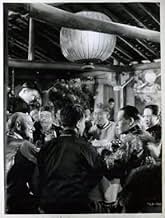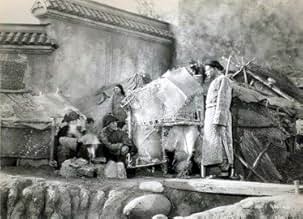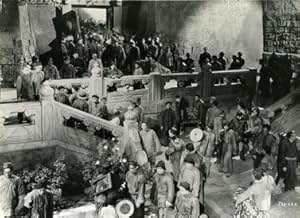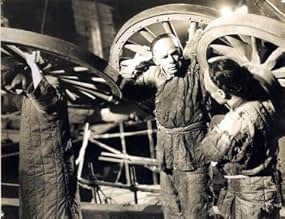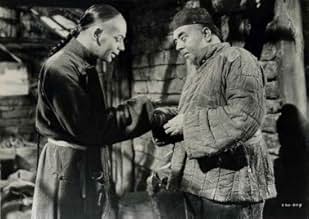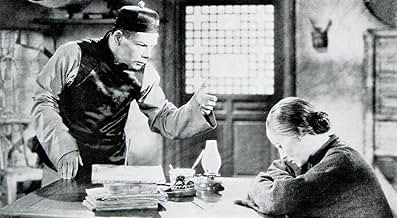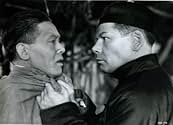Aggiungi una trama nella tua linguaAlthough married Chinese farmers Wang and O-Lan initially experience success, their lives are complicated by declining fortunes and lean times, as well as the arrival of the beautiful young ... Leggi tuttoAlthough married Chinese farmers Wang and O-Lan initially experience success, their lives are complicated by declining fortunes and lean times, as well as the arrival of the beautiful young Lotus.Although married Chinese farmers Wang and O-Lan initially experience success, their lives are complicated by declining fortunes and lean times, as well as the arrival of the beautiful young Lotus.
- Vincitore di 2 Oscar
- 7 vittorie e 3 candidature totali
- Revolutionary Army Captain
- (non citato nei titoli originali)
- Man
- (non citato nei titoli originali)
- Teahouse Dancer
- (non citato nei titoli originali)
- Chinese Girl
- (non citato nei titoli originali)
Recensioni in evidenza
This is a truly great epic story of love, individual rights, class strata, and men/women issues. The centerpiece of the film is two brilliant performances by Luise Rainer and Paul Muni.
Muni plays Wang, a Chinese farmer, who is about to take a wife (Rainer). From the start, he treats her with respect, during a time when women were looked on as little more than hired help. Without giving too much of the movie away, they go through the highs and lows of all relationships, and even though the story may take place in late 19th/early 20th century,the story and much of their feelings, seems credible.
Other than the fact that the movie is about 5-10 minutes longer than it needs to be, and the performances of Charley Grapewin and Walter Connolly are typical 1930's cartoon characters, this is a really wonderful movie that, unfortunately, has become a victim of political correctness.
9 out of 10
Perhaps it's partly because the story was written by a westerner, Pearl Buck who got a Pulitzer Prize for her novel in 1932. Ms. Buck, daughter of Chinese missionaries, probably brought China closer to the consciousness of America than any other person. Not the political struggles of China, but the lives and toil of the every day people we find in The Good Earth. Unfortunately later on, Pearl Buck became an apologist for the Kuomintang China of Chiang Kai-Shek in all its virtues and excesses. The rest of her literary output never matched The Good Earth.
In The Sundowners there is a great description of comparing China to Australia by Peter Ustinov. When asked the difference, Ustinov said China was very big and very full and Australia was very big and very empty. That's what you see in The Good Earth, China very big and very full of people, more than she can deal with at times.
The Good Earth tells the story of Wang Lung (Paul Muni) as a young man who purchases a wife from a large house where she was a slave. The woman O-Lan (Luise Rainer) bears him two sons and sees him through all the good times and bad they have, drought, famine, revolution, and a climatic locust plague.
Luise Rainer won the second of two consecutive Oscars for portraying O-Lan. She may have set some kind of record in that it has to be the leading player Oscar performance with the least amount of dialog. Everything she does practically is done with facial expressions, her performance could have been on a silent film with very minimal subtitles. I think only John Mills in Ryan's Daughter had fewer words and he was playing a mentally retarded man.
Muni is not always appreciative of how supportive she is in that male dominated culture. Rainer helps in the field, bears and raises the kids, does the housework. When Muni becomes a man of property he takes a Chinese second trophy wife who causes him a lot of grief. Still Rainer stoically bears it all. Still Muni is not a bad man and it's a tribute to the film and his acting and Buck's writing that you don't hate him and the culture gap is bridged.
We've got a group of oriental players now who do more than just Kung Fu movies. I'm surprised The Good Earth of all films has not been remade at this point. I'll bet the Chinese government would even let some American company do it on an actual location.
Till then we've got this great classic to appreciate and enjoy.
The story begins on the wedding day of Wang Lung (Paul Muni), a kind and gentle farmer. His wife, O-Lan (Luise Rainer), bears his sons and quietly encourages him to pursue his dreams, no matter what sacrifices they entail from her. The family lives through a famine and finally achieves prosperity and success. However, with success comes greed and corruption, and soon Wang is buying large plots of land and the Great Hall at which O-Lan was a servant. Eventually, he takes a second wife and breaks ties with all who were once close to him. It takes a tragedy for him to see the error of his ways.
All the while O-Lan stands behind him, supporting every decision he makes in her own tranquil way. Rainer's Oscar winning portrayal, like O-Lan herself, is the glue that holds the story together. Muni, often prone to hamminess in his work, shows restraint here and contributes a beautiful, multifaceted performance. The cinematography, which also received an Oscar, is excellent, as are the special effects. A sequence which involves locusts, invading the crops by the million, is nothing short of unforgettable. It is storytelling in the grandest sense of the word, with strong characterizations, high production values, and an engrossing story which more than justifies `The Good Earth's status as a classic.
It was soap-operish at times but had some visually dramatic moments, too, capped off by a locust attack at the end of the film. That was astounding to view. Considering this film is about 70 years old, the special-effects crew on this film did a spectacular job.
Paul Muni and Luise Rainer were award-winning actors in their day and they don't disappoint here, both giving powerful performances. The only problem is credibility as all the Asians are played by Caucasions and some of them, like Walter Connolly, just don't look real. I'd like to see a re-make of this movie with all-Asian actors, not for PC reasons but to simply make the story look and sound more credible.
From the very beginning of the picture, right after the lion's roar, we see the poignant tribute to Irving Thalberg, and we know that we are embarking on an important viewing experience. The scope of the story is very wide, and the filmmakers are up for the task. I was always struck by the abruptness of the final scene, but its power and beauty form an excellent example of the art achieved within the often cynical Hollywood film factory. And Lotus - the strangeness of her, and her dance, contrasted with the goodness of O-lan!
Aside from the oft-mentioned attributes of acting, photography and special effects, a major element in 'The Good Earth' is the score. Herbert Stothart may not be in the ranks of Hollywood's 'mighty handful' (Alfred Newman, Steiner, Tiomkin, Waxman, Herrmann), but his 'MGM-sound' scores regularly deliver the goods. True, Stothart had no hesitation in applying the syrup at first opportunity (one can imagine Louis B. Mayer positively ordering it), but in this picture, syrup gives way to sympathy. One of the pleasures of Hollywood's Golden Age films is that all the elements of a given film support each other, and great scores support not only the characters, but the entire film. Stothart's score is so sympathetic and so sincere, from the Main Title all the way through, and it enhances the story and the performances so naturally and at times transparently, that it must be considered a classic score. No great 'tunes' specifically, but plenty of effective mood, atmosphere and unabashed emotion. Many of today's audiences may find little to enjoy in such a combination, or they may be embarrassed by it, but I revel in it, as cinema such as this, which is delivered with such heart and good will is, especially in these times, nothing short of a gift.
The issue of non-Chinese playing Chinese characters has already been discussed on these pages, but I can only add: please, viewers, consider the film within the era that it was produced. The same kind of incongruity still happens today, perhaps not so much racially, but certainly culturally: Brad Pitt in 'Seven Years in Tibet', Keanu Reeves in 'Little Buddha', and other Americans getting plum roles in British-originated stories that become Hollywoodized, etc. When making 'Bhowani Junction', George Cukor considered using Indian actors, but vetoed any candidates in favor of familiar Hollywood faces. Never mind that in the 50s, as today, India had a huge film industry. It's just that those actors didn't fit into the Hollywood scheme of things. That speaks of box office more than political incorrectness. There is no doubt that fine actors like Philip Ahn should have gotten lead roles in pictures like 'The Good Earth', but at least we can enjoy them in supporting roles which carry a lot of weight in their own right. As time goes on, the context of past eras fades, while the films themselves, the really good ones, live on. There's plenty of opportunity for revisionist theses about issues like racial inequality in 1930s Hollywood, but for 138 minutes, it is compelling and moving to absorb onesself in the story and the atmosphere of 'The Good Earth'.
Lo sapevi?
- QuizSpecial effects experts were unable to produce an authentic-looking locust plague. Just as they were about to abandon the scene, they received word that a real locust plague was taking place several states away. A camera crew was rushed to the scene to capture it on film.
- Blooper(at around 2h 5 mins) Wang Lung is walking through the locust storm in his wheat field. He picks up a few men who have fallen down into the thick pile of locusts. In frustration, Wang shouts "I said save the wheat! Save it!" At this moment, a man dressed in 1937-era American clothing walks across the scene from left to right, at the top third of the screen. He is wearing a white hat and appears to be smoking a cigarette or cigar held in his left hand.
- Citazioni
Wang Lung: [must sell his land to feed his family but the buyers take advantage of him] Thieves! Thieves! And well you know I must sell.
O-Lan: No! Not the land. We'll not sell the land. We'll keep it. We'll go south and when we return, we'll still have the land.
Uncle: But I've arranged it. I brought these men here. You MUST sell!
O-Lan: Is it your land? Did you buy it bit by bit? The land is our life... and it's better to go south... or die walking... than to give it to you for nothing.
- Curiosità sui creditiIntroduction played with opening credits: The soul of great nation is expressed in the life of its humblest people. In this simple story of a Chinese farmer may be found something of a the soul of China - its humility, its courage, its deep heritage from the past and its vast promise for the future.
- ConnessioniEdited into La stirpe del drago (1944)
I più visti
Dettagli
- Data di uscita
- Paese di origine
- Sito ufficiale
- Lingua
- Celebre anche come
- The Good Earth
- Luoghi delle riprese
- Cedar City, Utah, Stati Uniti(backgrounds for locust sequence)
- Azienda produttrice
- Vedi altri crediti dell’azienda su IMDbPro
Botteghino
- Budget
- 2.800.000 USD (previsto)
- Tempo di esecuzione2 ore 18 minuti
- Proporzioni
- 1.37 : 1
Contribuisci a questa pagina




